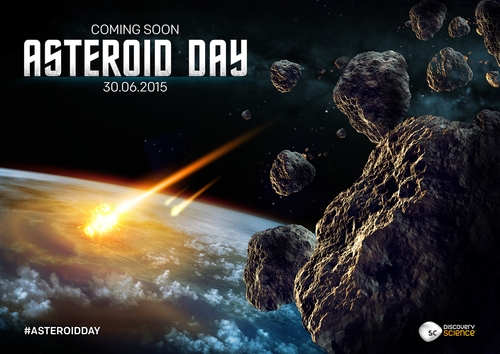| |
Taken from Headlines & Global News (May 31, 2015)
Asteroid Day 2015: Bill Nye, The Rock Band Queen, "Solsbury Hill" And Near-Earth Objects Are All Related?
What do Bill Nye (The Science Guy), Brian May (lead guitarist of the rock band Queen), Peter Gabriel and his "Sledgehammer" and asteroids have in common? Asteroid Day 2015.
by Kimberly M. Aquilina

Check out the website for events near you! (Photo : Discover Science/Asteroid Day) |
From a press release:
"Asteroid Day, a global day of education and awareness about asteroids, is a growing international movement to learn what we can do to protect our planet, families, communities, and future generations from dangerous impacts. Organizers in London today announced the series of events to be held worldwide on June 30, the anniversary of the largest asteroid impact on Earth in recent history, the 1908 Siberian Tunguska asteroid Impact.
"A full listing of Asteroid Day events can be found on the AsteroidDay.org website, including activities for the two premiere events in London and San Francisco. The film '51 Degrees North,' about a futuristic asteroid impact and its human ramifications, will premiere at London's Science Museum IMAX Theatre. At the California Academy of Sciences in San Francisco, the B612 Foundation and CalAcademy are hosting a full day of activities dedicated to education about asteroids, including films; presentations from scientists, filmmakers and astronauts; and hands-on activities for children. Regional events have been locally organized in Austria, Brazil, Bulgaria, Canada, Czech Republic, Germany, Greece, India, Italy, Korea, Mexico, Poland, Romania, Russia, Serbia, Spain, and Turkey, among other locations. Live webcasts from San Francisco, London and other locations will also be available online throughout the day at AsteroidDay.org.
"'Asteroids are the only natural disaster we know how to prevent, and protecting our planet, families, and communities is the goal of Asteroid Day,' said Grigorij Richters, President of Films United, Producer of '51 Degrees North' and co-founder of Asteroid Day. 'Asteroids teach us about the origins of life, but they also can impact the future of our species and life on Earth.'
"Last December, astrophysicist Dr. Brian May, founding member and lead guitarist of the rock band Queen, joined Lord Martin Rees, UK Astronomer Royal, Bill Nye, the Science Guy, and Astronauts Rusty Schweickart, Ed Lu, and Tom Jones to announce Asteroid Day and the 100x Declaration, calling for a 100-fold increase in the detection and monitoring of asteroids. Lord Rees read the declaration, which resolves to 'solve humanity's greatest challenges to safeguard our families and quality of life on Earth in the future.' Signed by more than 100 highly respected scientists, physicists, entertainment and business leaders, and Nobel Laureates from 30 countries, the 100x Declaration will be available for public signature beginning in June at AsteroidDay.org. Original signers include Anousheh Ansari, Stewart Brand, Brian Cox, Richard Dawkins, Alan Eustace, Peter Gabriel, Steve Jurvetson, Jane Luu, Brian May, Greg McAdoo, Peter Norvig, Helen Sharman, Jill Tarter, Kip Thorne, and more than 38 astronauts and cosmonauts. For a full listing of signatories, see http://www.asteroidday.org/signatories-list
"'The more we learn about asteroid impacts, the clearer it becomes that the human race has been living on borrowed time,' remarked Brian May. 'Asteroid Day and the 100x Declaration are ways for the public to contribute to bring about an awareness that we can get hit anytime. A city could be wiped out anytime because we just don't know enough about what's out there.'
"'Early warning is the sine qua non of planetary defense,' said Rusty Schweickart, Apollo 9 astronaut, founder of the Association of Space Explorers (ASE), and chair of the Asteroid Day Expert Panel. 'Time is an issue. At the current rate of discovery of 20-meter NEOs and larger at about 1,000/year, it will take more than 1,000 years to find one million NEOs that potentially threaten Earth. That's a long time, and even then we'd have reached only 10% or so of the Chelyabinsk-size objects that potentially threaten impact. By signing the 100x Declaration, the public will join us in calling for increasing our asteroid discovery rate to 100,000 (or 100x) per year within the next 10 years. We've simply got to get at it!'"
Additional information on Asteroid Day, the 100x Asteroid Declaration, is available at http://www.asteroidday.org and http://change.org
To read more about near-Earth objects and how NASA plans to keep Earth safe, check out HNGN's exclusive interview with John L. Remo, an astrophysicist who is currently working on asteroid and comet research in relation to potential impacts on Earth.
|
|